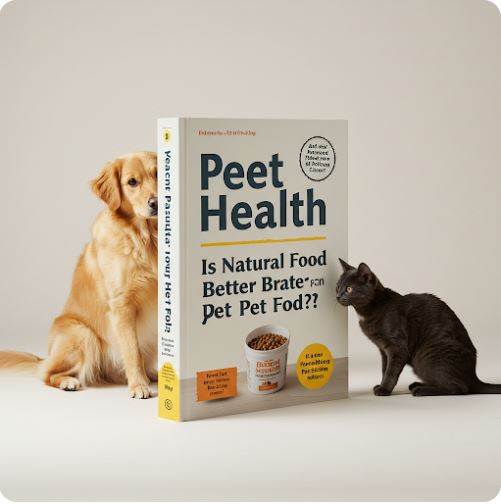Pet Health: Is Natural Food Better than Commercial Pet Food?
Introduction to Pet Nutrition
"Pet Health: Is Natural Food Better than Pet Food?"Explore the essential aspects of pet nutrition with our comprehensive guide. Learn about the differences between commercial and natural pet food, their health impacts, and how to make informed dietary choices. This article covers the importance of balanced nutrition for pets, the benefits of natural diets, and insights from veterinarians on choosing the right food for your furry companions. Whether you're considering homemade options or evaluating commercial brands, stay informed to promote your pet's health and well-being.
Understanding pet nutrition is essential for ensuring the overall health and well-being of our animal companions. Nutrition plays a critical role in a pet's life, influencing everything from physical health to behavioral aspects. The right diet contributes to a longer lifespan while helping to prevent various diseases that can affect pets, such as obesity, diabetes, and heart disease. In this regard, appropriate nutritional choices are paramount for pet owners.
There are primarily two types of diets available for pets: commercial pet food and natural or homemade diets. Commercial pet food is commonly available in various forms, including dry kibble, canned food, and treats. These products are designed to meet the basic nutritional requirements of pets as established by veterinary standards. However, there has been growing interest in natural diets, which emphasize whole, unprocessed ingredients that may provide higher nutritional value. Advocates of natural food argue that it mimics the dietary habits of a pet's ancestors in the wild and can result in better health outcomes.
The role of food in a pet's life extends beyond mere sustenance; it directly impacts their physical condition and immune system. A balanced diet rich in essential nutrients, vitamins, and minerals can enhance a pet’s energy levels, support healthy skin and coats, and improve digestion. Moreover, specific nutrients contribute to stronger immune responses, making pets less susceptible to infections and illnesses. Consequently, pet owners must evaluate the quality and nutritional completeness of the foods they provide to their furry friends, ensuring that their dietary choices promote health and longevity.
As the conversation surrounding pet nutrition evolves, it is crucial for pet owners to remain informed about their options and the potential benefits and risks associated with each dietary path. With greater awareness, pet parents can make informed choices that significantly improve their pets’ quality of life.
Understanding Commercial Pet Food
Commercial pet food is widely popular among pet owners due to its convenient packaging and availability. It primarily comes in three forms: dry, wet, and raw. Each type has its unique characteristics and benefits. Dry food, also known as kibble, is often favored for its long shelf life and ease of storage. Wet food is typically more palatable for pets due to its moisture content and aroma, making it suitable for picky eaters. Raw food diets, which may include fresh meats, bones, and vegetables, have garnered attention for being natural but require careful handling to avoid bacterial contamination.
The ingredients in commercial pet food can vary significantly. Typically, they consist of protein sources, carbohydrates, fats, vitamins, and minerals. The primary protein source may come from meat, fish, or plant-based ingredients. Grains such as corn or rice are commonly used as fillers, but some pet owners prefer grain-free options, believing that grains could contribute to allergies or digestive issues. Additionally, artificial preservatives, colors, and flavors are often added to enhance the appearance and shelf life of the food, although some pet owners remain skeptical about their safety and necessity.
Regulations surrounding pet food production and labeling play a crucial role in ensuring the safety and efficacy of commercial pet food. In many countries, government agencies establish standards that manufacturers must adhere to in order to market their products. This may include guidelines on ingredient sourcing, nutritional claims, and labeling practices. However, the enforcement of these regulations can vary. Consequently, pet owners should familiarize themselves with pet food labels, as understanding the ingredients and the nutritional composition is essential for making informed choices that support their pets' health and well-being. A thorough examination of what goes into commercial pet food, combined with a knowledge of regulations, is vital for pet owners who strive to provide the best diet for their furry companions.
Exploring Natural Pet Food
Natural pet food is defined by its use of whole, unprocessed ingredients that closely resemble the diets found in an animal's natural habitat. Such foods often contain organic ingredients, avoiding synthetic additives commonly present in commercially produced pet foods. Whole foods typically include fresh meats, vegetables, and grains, which provide the essential nutrients that pets require for optimal health.
The benefits of feeding pets natural foods are multi-faceted. Firstly, these diets are believed to be more nutritious because they are less processed and specifically designed to meet a pet's dietary needs. Many pet owners report improvements in their pets’ coat condition, energy levels, and overall vitality after switching to natural options. Additionally, natural pet food often contains fewer allergens and irritants, thus reducing the risk of allergic reactions that some pets may experience with commercial pet food.
Another significant advantage is the transparency in sourcing. Natural pet food brands are often committed to high-quality ingredients, and many provide detailed information about where those ingredients come from. This transparency helps pet owners make informed decisions about what they are feeding their pets. In contrast, processed pet foods can contain fillers, preservatives, and artificial flavors that may not only compromise the health of pets but may also contain ingredients that are less desirable from a nutritional standpoint.
Furthermore, studies suggest that natural diets may contribute to better digestion in pets. The whole-food components often lead to improved nutrient absorption and reduced gastrointestinal issues, enhancing the overall health of pets. However, it is crucial for pet owners to ensure that any natural food they choose is well-balanced and meets the specific nutritional needs of their pet. By carefully selecting natural pet food, owners can provide their pets with a diet that supports their health and well-being, setting a strong foundation for a longer, happier life.
Nutritional Analysis: Commercial vs. Natural Food
The debate surrounding the nutritional profiles of commercial pet food and natural food has gained significant traction among pet owners and veterinarians alike. When evaluating these two options, it is essential to consider both macro and micronutrients that contribute to a pet’s overall health. Commercial pet food typically includes a blend of protein, carbohydrates, fats, vitamins, and minerals, formulated to meet specific dietary guidelines set by regulatory bodies. However, the quality and sources of these nutrients can vary widely between brands.
In contrast, natural pet food tends to emphasize whole, unprocessed ingredients, often free from artificial additives and preservatives. These foods frequently consist of high-quality proteins sourced from meat, fish, or poultry, along with whole grains, fruits, and vegetables that provide essential vitamins and minerals. Natural foods are generally regarded as being more nutritionally complete because they maintain their original nutrient density and are less likely to contain fillers that dilute the food's overall efficacy.
Another critical factor in the comparison is the presence of additives found in many commercial pet foods. These may include preservatives to extend shelf life, artificial flavorings, and colors that can appeal visually but provide little nutritional value. Some pets may also have sensitivities or allergies to these substances, leading to health issues. Conversely, the absence of artificial additives in natural foods often results in a lower incidence of such problems. While commercial pet foods may offer the convenience of availability and affordability, natural options often promote better health outcomes, aligning with the evolving trend towards a more holistic approach to pet nutrition.
Ultimately, the choice between commercial and natural pet food can significantly impact a pet's health. Understanding the differences in their nutrient profiles and the potential effects of additives is crucial for informed decision-making.
Health Benefits of Natural Food for Pets
The choice between natural food and commercial pet food has gained traction among pet owners, particularly in relation to the health benefits that natural diets may offer. One of the most notable advantages is the improvement in coat condition. Pets that are fed a diet rich in whole, natural ingredients often exhibit shinier and healthier coats, which can be attributed to the higher levels of essential fatty acids found in such foods. This nutritional enhancement can reduce shedding and dandruff, resulting in more vibrant fur.
Moreover, digestive health is another compelling reason to consider natural food for pets. Many commercial pet foods contain fillers and artificial additives that can disturb the digestive systems of sensitive pets. In contrast, natural pet food tends to consist of easily digestible ingredients, facilitating better nutrient absorption and assimilation. This shift can lead to more regular bowel movements and less gastrointestinal distress. Pet owners who have transitioned their animals to natural diets frequently report noticeable improvements in their pets' digestion, thereby reducing issues such as bloating and discomfort.
Energy levels also significantly benefit from a natural diet. Pets often exhibit increased vitality and stamina when consuming nutrient-rich foods devoid of artificial preservatives and fillers. Many pet owners who switched to natural food have observed their pets displaying more enthusiasm during walks and playtime, a clear sign of improved overall energy. Natural food not only nourishes but can also enhance the quality of life for pets, enabling them to engage more with their environment.
Lastly, natural diets may better support immune function and disease prevention. A diet abundant in vitamins, minerals, and antioxidants works to bolster a pet's immune system, potentially reducing the incidence of chronic diseases. By opting for natural food, pet owners may lessen their pets' susceptibility to health issues, promoting longevity and vitality. These testimonies underpin the argument for natural food diets, illustrating the various health benefits that can arise from making informed dietary choices for companion animals.
Risks and Considerations of Homemade Natural Diets
While many pet owners are drawn to the idea of providing their pets with homemade natural diets, it is crucial to recognize the associated risks and challenges. One of the primary concerns is the potential for nutritional imbalances. Many commercial pet foods are formulated to provide complete and balanced nutrition, ensuring that pets receive the essential vitamins, minerals, and nutrients necessary for their overall health. Conversely, creating a homemade diet that meets all of a pet's nutritional requirements can be complex and often requires careful research, planning, and consultation with a veterinary nutritionist.
Another significant consideration is the safety of raw diets. Many proponents of natural diets advocate for raw feeding, believing that it is closer to a pet's ancestral diet. However, raw diets can pose health risks, including exposure to harmful bacteria such as Salmonella or E. coli. These pathogens can affect not only the pet consuming the food but also pose a risk to humans handling the food, particularly children or immunocompromised individuals. Therefore, it is essential for pet owners considering a raw diet to implement strict hygiene practices when preparing, storing, and serving food.
Furthermore, the importance of formulating balanced meals cannot be overstated. A diet lacking in specific nutrients may lead to long-term health issues, including obesity, dental problems, or organ failure. Pet owners should be aware that simply mixing ingredients does not guarantee a balanced diet. A comprehensive understanding of pet nutrition is essential, which is why the guidance of a veterinarian or a qualified pet nutritionist is often advised. They can help create a meal plan tailored to an individual pet’s specific needs, ensuring that all nutritional bases are covered while mitigating health risks associated with homemade natural diets.
Expert Insights: Veterinarians on Pet Nutrition
Understanding the nutritional needs of pets has evolved, with veterinarians emphasizing the importance of choosing the right food to maintain optimal health. In recent discussions with veterinary professionals, insights have emerged regarding the ongoing debate between natural food and commercial pet food. While both options have their merits, the choice largely depends on several factors, including the specific dietary requirements of individual pets.
Many veterinarians express concerns about commercial pet food due to the presence of artificial additives, fillers, and meat by-products. These components can lack essential nutrients and often lead to long-term health issues. However, reputable commercial brands are improving their formulas, increasingly focusing on higher-quality ingredients that contribute to better overall health. Some vets recommend looking for veterinary-approved brands, as they adhere to stringent nutritional standards.
On the other hand, advocates of natural pet food argue that a diet rich in whole foods, such as fresh meats, vegetables, and grains, can provide a balanced nutrition profile without harmful additives. Vets agree that a well-prepared natural diet can be beneficial, but caution against the potential risks of unbalanced homemade recipes. Incorrect nutrient levels can lead to deficiencies or excesses that may harm a pet’s health.
Veterinary nutritionists encourage pet owners to consult with professionals when considering diet changes. They emphasize the importance of understanding a pet’s specific needs, which may vary by age, breed, and health status. Continuous education and awareness of pet food options can empower owners to make informed choices that promote their pet's health and well-being. Ultimately, whether choosing natural or commercial foods, the focus should always remain on balanced nutrition that supports a happy, healthy life.
Consumer Choices and Trends in Pet Food
The landscape of pet food has undergone significant transformation in recent years, with a marked shift in consumer preferences towards natural and organic options. Pet owners are increasingly becoming more discerning about the quality of food they provide for their pets, opting for products that prioritize health and natural ingredients over those laden with artificial additives. This trend aligns with a broader movement toward holistic approaches to animal care, mirroring developments in human food consumption.
Market research indicates that the natural and organic pet food sector is experiencing robust growth. According to reports, the global organic pet food market was valued at several billion dollars in 2023 and is projected to maintain a substantial annual growth rate over the next five years. The trend reflects not only a change in consumer preferences but also an increased awareness of the potential health benefits that natural pet food can confer on animals. Consumers are drawn to products that promise minimal processing, high-quality ingredients, and transparency in sourcing, indicating a substantial change in purchasing behavior.
Pet owners today are more likely than ever to research food brands thoroughly before making a purchase. They are seeking out certifications, reading ingredient labels, and engaging with brands that demonstrate ethical sourcing practices and sustainability. This growing demand for transparency is also shaping how pet food companies formulate their products. As a result, many brands are reformulating existing products or launching new lines that align with these consumer expectations.
This shift in consumer behavior toward natural options underscores a significant trend toward prioritizing animal health and wellness. Pet owners increasingly view their pets as family members, which amplifies their concern for what they feed them. Consequently, the pet food industry is responding with a wider array of natural and organic products to meet these new expectations, ultimately driving a change in the market that will likely continue to shape the future of pet nutrition.
Conclusion and Recommendations
Throughout this article, we have explored the benefits and drawbacks of natural food versus commercial pet food, analyzing the nutritional needs of pets and the potential impacts of each diet type. Both commercial and natural food options have their merits, and the choice ultimately depends on individual pet requirements, owner preferences, and veterinary guidance.
When considering transitioning to natural food, it is vital for pet owners to approach the shift gradually. A sudden change in diet can lead to gastrointestinal upset for pets, so a gradual mix of the new food with the old is advisable. Start with a small quantity of natural food added to their existing diet, and gradually increase the natural food's proportion over a period of several days or weeks. This method ensures that pets adapt smoothly and allows for monitoring any adverse reactions.
Furthermore, pet owners must take into account their pet's specific health conditions and age when selecting the most suitable food. Puppies and kittens have different nutritional requirements than adult or senior pets, and those with allergies or medical concerns necessitate tailored diets that may not align with general recommendations. A consultative approach with a veterinarian can help determine the best dietary choice for individual pets, ensuring they receive appropriate nutrition tailored to their unique needs.
In conclusion, whether opting for natural food or commercial pet food, the emphasis should be on quality, safety, and nutritional adequacy. Education on ingredient sourcing, potential allergens, and dietary balance is crucial. By prioritizing these factors and regularly consulting veterinary professionals, pet owners can make informed decisions that promote the health and well-being of their furry companions.
Loja de Livros
Ofertas | Para Você | Mais Vendidos | Lançamentos | Indicações | Kindle Unlimited | eBooks Kindle | Livros Usados | Audible





















